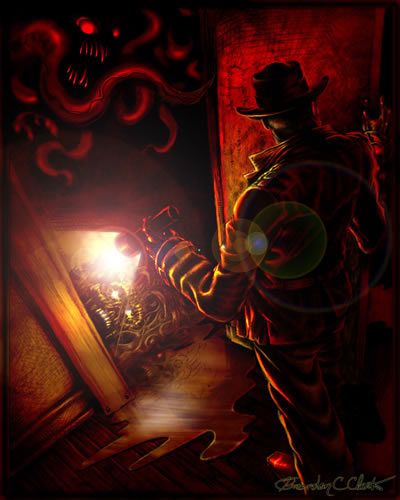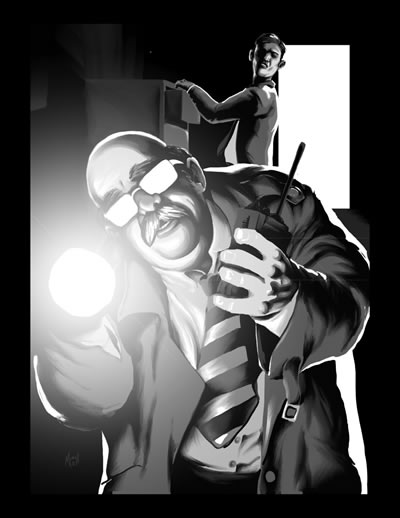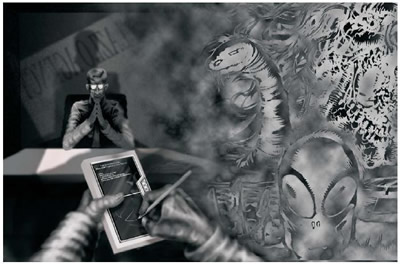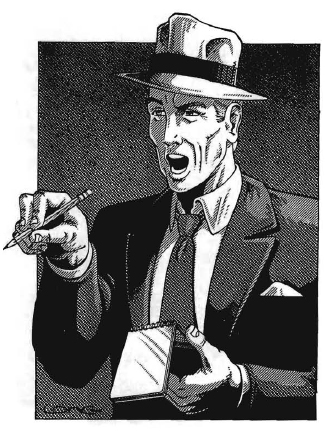“When you have eliminated the impossible, whatever remains, however improbable,
must be the truth.” –
Sherlock Holmes
When Investigation Skills Fail
 I've written up an expanded version of the Game Master Advice from
BTS-1 that I plan to include in an upcoming sourcebook. One of the areas of expansion goes into dealing with failing investigation based skill rolls and Perception rolls as they can completely grind an investigation scene, and therefore the entire game, to a halt.
I've written up an expanded version of the Game Master Advice from
BTS-1 that I plan to include in an upcoming sourcebook. One of the areas of expansion goes into dealing with failing investigation based skill rolls and Perception rolls as they can completely grind an investigation scene, and therefore the entire game, to a halt.
Well, I keep coming across GM’s who ask about this issue (on the forums and in person), so I thought it would be worth saying a few things about it here in the House (at least until the full version is published). Note that this is NOT a reprint of what I'm writing in the sourcebook; the following info is all broad strokes and off the cuff.
First off, know that I’m very pro “planning ahead” when it comes to BTS adventures. For those who do not
(or haven’t really tried to plan ahead), let me say that horror RPG’s in my opinion are THE hardest genre to just “wing it” and go by the seat of your pants (and I've played/GM’d all sorts of genre’s to know what I’m talking about).
And in horror RPG’s, the investigation scenes are often the most important aspects of the adventure.
So putting all your investigation materials and clues together beforehand is one of the greatest services you can do for yourself as a GM, and the players will love you for it as the multitude of clues makes them feel more like interactive investigators, and a part of the bigger picture of the adventure overall.
But what happens when the players find a mangled body that holds important clues to the progression of the story, but the forensic player(s) fail their skill rolls? That’s what I’m going to talk about here. But to do this right, Ill set up a simple example scenario of the clues the players will need to progress in their adventure.
 Jimmy ‘The Stool Pigeon’ Jones is an informant of some law enforcement organization who’s been working with a task force to uncover an illegal dog fighting operation. But
Jimmy gets in over his head as he’s not only found a well established and well
managed underground dog fighting club, the manager of the club has gotten bored with
using ordinary dogs. He has upgraded to using Hell Hounds!
Jimmy ‘The Stool Pigeon’ Jones is an informant of some law enforcement organization who’s been working with a task force to uncover an illegal dog fighting operation. But
Jimmy gets in over his head as he’s not only found a well established and well
managed underground dog fighting club, the manager of the club has gotten bored with
using ordinary dogs. He has upgraded to using Hell Hounds!
However, as Jimmy was on his way to report the details of the operation and its location (cell phones aren't allowed in the club, so he hid one nearby before attending), the manager of the fight club (who's also a practicing mage/shifter type) gets onto him somehow and sends a few hell hounds to hunt Jimmy down and kill him.
And indeed, the hounds find him just as he makes his way inside a nearby old auto repair shop, mauling him just as he dials 911 (allowing the police to track his cell phone to the shop).
Due to the bizarre nature of the mauling, the PC’s are asked to help investigate (or whatever situation is appropriate to get the party looking into the crime scene). The well seasoned forensic expert in the party, who only needs to roll below an 85% to successfully deduce the pertinent clues of the scene, happens to roll a 98%. So what do the players (and the GM) do now?
Well, don’t fret… there are several ways to skin this cat. Below are but a few possible suggestions to help get the players back on track.
-Offer multiple clues to help lead the group to the right conclusion:
Allow the players with the deductive skills to roll once for each clue at the crime scene. This way if they fail to deducing the reason the first clue is useful evidence, they may correctly deduce and understand other clues with successful skill rolls.
This in turn may help them deduce what the other evidence means on their own. Even if the PC failed the skill check, always give credit when the players are involved and figuring it out themselves.
 -Allow the non-investigative minded PC’s at the scene to make a Perception roll: The highest roll gets awarded with seeing/understanding a key part of the evidence.
-Allow the non-investigative minded PC’s at the scene to make a Perception roll: The highest roll gets awarded with seeing/understanding a key part of the evidence.
Example: “Marty, you're not a forensic guy by any means, but while observing the body, you determine by the deep tooth marks in the skin and bones that while they seem very canine-like, they’re too jagged and misshapen to be ordinary.”
You could go more obvious with something like “Marty, you've seen bites and claws marks like these before… they look very similar to wounds inflicted by Hell Hounds!”
One way to handle this with a more thematic approach is to have the PC with the highest perception roll discuss the details he found with the forensic expert PC, and once he’s pointed out what he noticed, let the forensic PC roll a skill check again due to the new perspective, stating that perhaps “you must have overlooked this aspect of the clue when you examined the body the first time around”.
-Speak on the character's behalf: This is a great method if the players have at least one or two clues to work with. Certainly the GM should always let the PC's try to fathom it all out on their own, but sometimes you might want to interject if the group is stuck, explaining something from the point of view of one of the characters. Take this example from the point of Joe, the group's forensic expert, with the GM speaking on his behalf.
As Joe gives the facts, the notes in parenthesis are the reasons behind them:
Joe: “I seem to be missing something here, but these are the facts to consider.
The victim was found lying face down. The victim’s knees and elbows were recently bruised, and the first bite, which was likely lethal, came from the back of the neck” (the lead Hell Hound lunged and knocked the victim to the ground from
behind as it's jaws clamped around his neck).
Joe then pulls a book of matches and a pack of a unique brand of cigarettes from the victim's coat pocket. Judging from the minimal amount of wear, this pack of cigarettes has only been recently opened and only two or three cigarettes have been removed.
The outside of the matchbook reads “Chu’s Chinese Cuisine”. Opening the flap of the book reveals that three matches have been pulled out, and on the inside of the flap there’s an address (this address will lead them to the abandoned and empty warehouse, where the dog fights are taking place.)
Note: If/when an investigation is made at the warehouse, the group can confirm that two cigarette butts with the unique logo brand and three burnt out match sticks are found just inside the front entrance of the warehouse (Jimmy watched the fighting while standing close to the door as he smoked). This confirms that Jimmy came here shortly after going to the restaurant. Other evidence inside the warehouse would confirm that some kind of fighting took place here, and perhaps more clues could help lead them to the club owner’s location/hideout/Hell Hound pen.
-Use the psychic characters talents in place of the failed investigation skill:
A Psychic Sensitive may get an overwhelming adrenaline rush upon entering the auto shop, feeling a sense of “the thrill of the chase, the blood lust of predators and the anticipation of violently killing their prey”. He can probably even taste the blood of the victim on his lips (and may need to save against his M.E. to avoid getting sick by the sudden onslaught of such extreme sensations).
A Psychic Medium might see a ghostly recreation of the victim running into the auto shop and getting mauled by the pursuing Hell Hounds, or the victim’s spirit could still linger in the mechanics garage, pleading with the Medium to “look at the match book” and may even manage to sputter out the words “Hell …. Hounds”
Side Note: never let a ghost/spirit give all direct details unless its pivotal to the story’s progression. If the PC's want to go that route, a seance should be required.
A Diviner might see a sign from the way the remaining matches in the match book have been bent or warped from use, telling him the address was freshly, but hastily written down (within the last few hours). The Diviner might even be able to follow the trail of the Hell Hounds with his divining rod back to the warehouse (as the Hell Hounds returned to their master at the warehouse after killing Jimmy).
A Latent Psychic might have had a precognitive dream the night before of
“Hell Hounds fighting amongst themselves in a pit full of bones as faceless spectators aggressively and passionately cheer them on”. While the pit of bones and the faceless spectators are excessive examples, the fighting Hell Hounds have a spotlight over them (as if to enhance the point of the dream) and the latent should make the correlation of this dream and the mauled victim.
Psionic abilities like Clairvoyance, Commune with Spirits, See the Invisible, Object Read, Precognition, Remote Viewing, and others could also provide insights and clues to the investigation.
-An NPC can lead them in the right direction: One of the police investigators says out loud “The victim looks like he was mauled by wild animals; I’d say a pack of dogs...
(Note: This statement makes sense to the police detective as Jimmy was working on obtaining information about a dog fighting club to begin with, but the PC's may not know that useful bit of info before now)
...But their teeth and claws are sharper than anything I've ever seen, and their jaws would have to be abnormally large and strong to get a bite around his neck like that. What the hell kinda dogs are these sicko’s using?”
In past games I've run and played in, when in doubt, we called up or visited with our contacts or experts in a pedicular field who might have something to offer.
This happens ALL the time in movies, TV shows, books and so on, and makes perfect sense for characters to do as they just don't know everything. Sometimes this leads to some interesting side quests and role-playing opportunities in the process.
-Give the PC's the vital clues straight out: If all else fails, the easiest way to solve this issue is to just give the PC’s the important clue(s), but ONLY the minimum amount of details about them… then let the PC's figure out the meaning of the additional clues on their own as they find and discuss them.
As they correctly deduce what a clue means, offer up or remind them of the smaller clues that help
confirm their conclusions. What this entails could be a grocery list of clues,
some of which they draw conclusions from, some of which may leave them puzzled.
How the player handle the unsolved clues is their own responsibility in this
case.
The PC's can try to decipher the clues in a multitude of ways: The PC's
could talk to their mentors or other experts in the field about what they've
found to see what they think,
or the group may try to reason it out again after a few hours
away from the clues or after some new insight to the crime is realized, or the group could back track to previous clues found and compare those to the new clues in the hopes to strike a chord or figure out the connection between it all. They could perform a multitude of these options as needed during a given scene.
The important thing to keep in mind is that the players need to obtain the clues somehow, regardless of their skill rolls. The fun part of clues are
usually figuring them out (as opposed to looking for them), and if this means the players need to really ponder and deduce the clues given to them because they failed a
skill roll, or even worse, they misinterpret the clues presented to them, they are still involved in the RPG interaction process and enjoying the game together. Sometimes these erroneous directions and deduction can create fun and exciting role-playing opportunities.
Handling these setbacks and figuring out the clues on their own is both adventure worthy and experience point worthy.
Note: In some cases, it may be pertinent to let the group fail to determine what the clues mean. They may have to sit on the clues (or that investigation altogether as they deal with a completely unrelated investigation in the meantime) and then try again later, after more clues or perspectives about this case are revealed by the GM sneaking them in, or the group gets involved in a new case that turns out to be related to the one they couldn't deduce earlier. This shouldn't happen all the time as it gets old, but on occasion (especially if it leads to an epic story in the making) it’s a worthwhile venture.
On the other hand, if the group is blazing a trail and picking up on the clues too fast and threatening to reach the ending early, throwing in a red herring in here and there can be fun and extend the life of the adventure.
The House of BTS is a fan site and all of it's content is free. However please consider a small donation
as it will help maintain the site and help provide new information, artwork and materials.
As the Host of the House, I thank you for your generosity!



